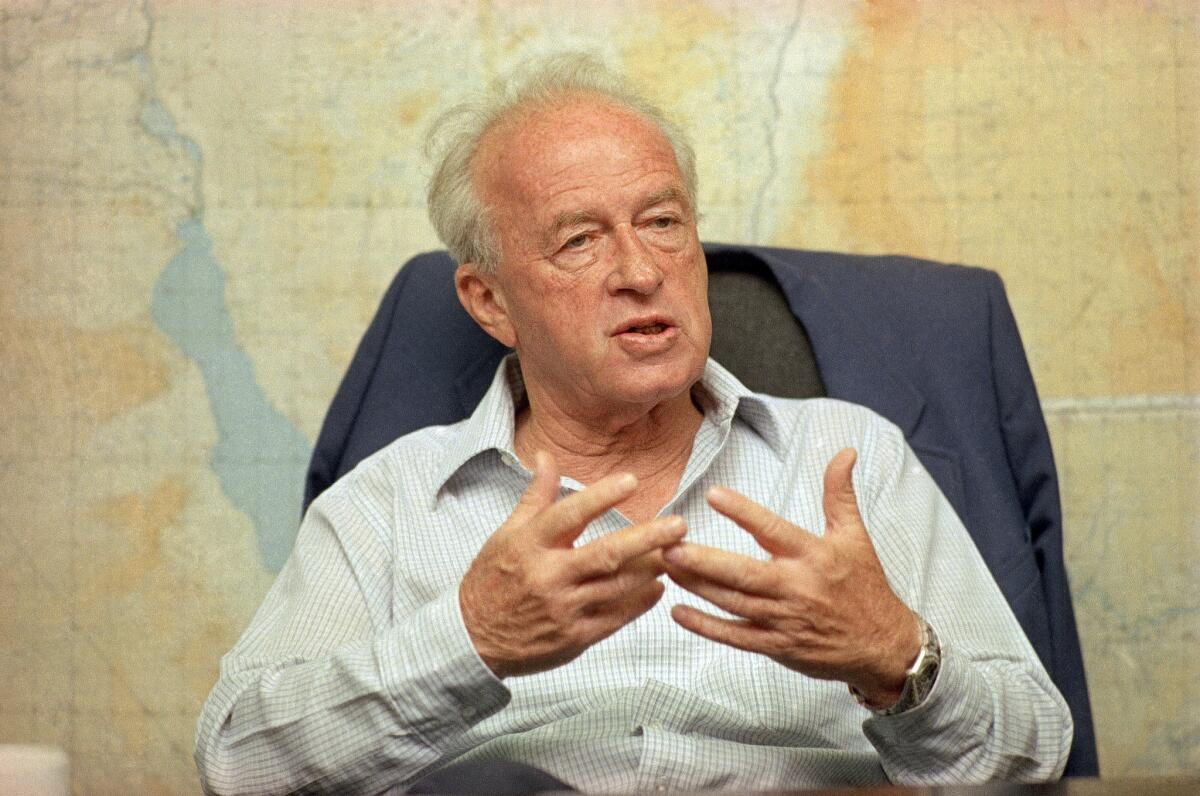Op-Ed: What would have happened if Yitzhak Rabin had lived?

Then Israeli Defense Minister Yitzhak Rabin talks with the Associated Press on May 18, 1989 at the Ministry of Defense office, in Tel Aviv, Israel.
- Share via
I last saw Israeli Prime Minister Yitzhak Rabin on Nov. 1, 1995, three days before his assassination. As President Clinton’s chief negotiator in the Middle East, I was briefing him on my talks with Syrian President Hafez Assad and discussing my upcoming meeting in Gaza with the Palestinian leader, Yasser Arafat. But I was not just focused on negotiating tracks. I also wanted to hear how he was handling an increasingly ugly atmosphere in Israel.
It had been five weeks since we had concluded the Interim Agreement, which would bring the Palestinian Authority to all the major cities in the West Bank, produce the Israeli military’s withdrawal from those cities and provide for Palestinian elections. For those on the Israeli right and in the settler movement, the Interim Agreement spelled the end of Israel holding on to the religious heartland of Jewish history. They were absorbed by that historic connection rather than the fact that, in the present day, Palestinians were the majority population in the West Bank.
The narrow margin of approval for the agreement in the Knesset, 61 to 59, added to the venom of the opposition. There were large, sometimes violent, demonstrations during which Rabin was called a traitor and depicted in a Nazi uniform or an Arab kaffiyeh. The main opposition party, Likud, and its leaders, Benjamin Netanyahu and Ariel Sharon, seemed to be looking for ways to block implementation of the agreement.
Was Rabin worried about being able to proceed with the agreement, I asked? No, he replied, the Israeli army would follow orders, and he would face down the opposition. Was he worried about his own security, I asked, noting that his car had been jostled by demonstrators? Again he said no; he was not indifferent to the pain felt by the settlers, but he had the responsibility to look to Israel’s future.
Only a year before, he had told me that, given the demographic realities, if Israel were to avoid becoming a binational state, it had to separate from the Palestinians. He preferred to achieve “the partition” by negotiation, but if the Palestinians proved unable to agree on the terms, he would do it unilaterally and that was why he was going to build a “separation barrier.”
Rabin was always fearless, and in this meeting, sensing my unease about his situation — politically and personally — he told me not to worry. In fact, he changed the subject and asked me to tell Arafat to deal with the growing Hamas infrastructure in Gaza. But when I asked him for specifics so I could give Arafat concrete examples of what he needed to do, Rabin reconsidered and said Israel should raise the issue first. His parting words still haunt me: “Dennis,” he said, “expect anything.”
Whatever my worries, I did not expect his assassination. I could not fathom that Rabin — a leader who had fought for Israel his entire life, first as a soldier on the battlefield and then as a statesman on the world stage — could be murdered by an Israeli.
His parting words still haunt me: ‘Dennis,’ he said, ‘expect anything.’
That event would give Clinton a deep sense of purpose. He had told Rabin in their first meeting that if the Israeli prime minister took risks for peace, then his job — the job of the United States — was to minimize those risks. And, after the assassination, Clinton was driven not by preoccupation with his personal legacy but by the debt he felt he owed Rabin.
He and I would not succeed in fulfilling that debt. Arafat said no to our parameters at the Camp David summit in 2000, and he said no again to our bridging proposal to resolve the conflict at the end of the Clinton administration.
I am often asked what would have happened if Rabin had not been assassinated. Would Arafat’s answers have been different? I don’t know. But six months before the assassination, Rabin told me that the outcome of the next Israeli election would depend on whether Hamas detonated two bombs prior to it. That, he said, would defeat him and elect his Likud opponent.
He was close to right. After the assassination, four Hamas bombs in 1996 helped defeat Shimon Peres, who otherwise would likely have won a mandate to fulfill the Rabin mission.
The other question I’m often asked is what Rabin would do today, with a wave of terror stabbings, complete stalemate with Palestinians, a delegitimization movement against Israel and the Arab state system itself under threat in the Middle East?
He would launch an initiative to blunt the delegitimization movement by showing that Israel was not responsible for the absence of peace. He would make sure not to build in what would be the Palestinian state and would freeze all settlement activity outside the blocs or to the east of the security barrier. And, if the Palestinians were still too dysfunctional to make peace, he would find a way to separate from them.
For Rabin, preserving Israel as a Jewish and democratic state was his life’s work, and that ambition would guide him to this day.
Dennis Ross is counselor at the Washington Institute for Near East Policy and served in senior positions in the George H.W. Bush, Clinton and Obama administrations. His new book is “Doomed to Succeed: The U.S.-Israeli Relationship from Truman to Obama.”
Follow the Opinion section on Twitter @latimesopinion and Facebook
More to Read
A cure for the common opinion
Get thought-provoking perspectives with our weekly newsletter.
You may occasionally receive promotional content from the Los Angeles Times.










